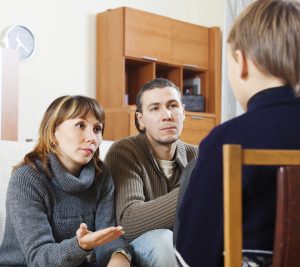 Divorce can be a tough thing for adults to deal with. From deciding how property will be divided to finding a good attorney, there can be a lot of factors that go into finalizing a divorce. Adults, however, aren’t the only ones that are affected by divorce. Not only will children of divorcing parties have to go through the process of dividing up their family, but they also have little to no input on these new changes to their lives. While this can be a stressful and confusing time in a child’s life, there are some things you can do when talking with your children to help them understand what is going on better.
Divorce can be a tough thing for adults to deal with. From deciding how property will be divided to finding a good attorney, there can be a lot of factors that go into finalizing a divorce. Adults, however, aren’t the only ones that are affected by divorce. Not only will children of divorcing parties have to go through the process of dividing up their family, but they also have little to no input on these new changes to their lives. While this can be a stressful and confusing time in a child’s life, there are some things you can do when talking with your children to help them understand what is going on better.
Pick the Right Time
Divorce is a big issue for adults, and is usually a world-changing one for children. Not only will they have less contact with one, or both parents, but they may also have to relocate as a result of the divorce. While there might be circumstances beyond your control, it is always best to pick a time when everyone in the family, including the child’s other parent, can discuss the divorce together.
In addition to this, it is always important that you do not just spring the news on the child a few days before the divorce happens. You want to be able to give the child some time to adjust to the new changes, and to better understand what is happening.
Tell the Truth
When talking to your child about divorce it is important to tell the truth. Children can be very perceptive, and can be aware of when adults are lying to them. Your children are part of the family as well, and they deserve to know why their family is being broken up. That being said, it is always best to keep things simple and honest, and to remind the child that the divorce does not affect your feelings for the child. Your children will appreciate your honesty, and will be more likely to adjust better to any new changes.
Avoid Blaming
One of the biggest mistakes a parent can make is to blame the other parent in front of the children. While some parents might think that this would paint the other parent in a negative light, they are only hurting their own relationship with their children. Children are more likely to respond positively to you, and your decision to divorce, if you can discuss the divorce with respect for the other parent, even if the other parent might be at fault for the divorce.
Be Aware of Your Child’s Needs
Children grow and develop at different rates. While one of your children might be very mature for her age, another might not be quite as mature. While younger children will generally be satisfied with a simple, clear answer, pre-teens and teens will want to know more. Being aware of how much information your child might need, or how much information they might be able to handle, can go a long way to helping them adjust to the new changes. With that in mind, regardless of the child’s age, it is always important to make sure that the child understands that the divorce is not their fault, and that both parents still love the child.
Keep a Unified Front
Because this divorce will have such an impact on the child’s daily life, it is always best to provide as much stability as possible from the beginning. If possible, make sure to speak with the other parent in order to present a mutually agreed upon explanation about what is happening. Even if you may disagree with your spouse on certain matters, cooperation is worth it to help your child ease into the transition.
Focus on Them
It can be easy to forget that divorce involves more than just two people and the court. Not only do living arrangements change, but property is divided, and support payments might even be required from the court. Even though the court proceedings will be between you and your spouse, your children will have as much to do with the divorce as you do. When talking with your children, make sure to inform them about how the divorce will affect them, and avoid topics that don’t concern them, such as finances or other disagreements.
Let them be Honest
Most, if not all decisions in a divorce are made by the adults around the children. Whether it’s the parent’s decision to divorce, or the court’s decision to place the children with one parent over another, divorce can be a frustrating and frightening time in a child’s life. It is important to remember that you are not the only one with something to say, and that your children have opinions on the matter as well. Allowing your children to express how they feel about the situation can help them get a better grip on what is going on, and can help them cope with the changes that may happen.
